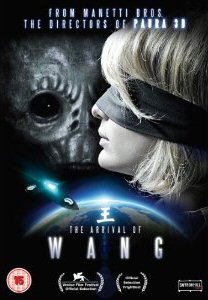
(A.k.a. LíARRIVO DI WANG)
Gaia (Francesca Cuttica) is busy in her apartment one morning, working at interpreting an Asian film for its Italian distributors. Her telephone rings; itís former client Da Renzi (Rodolfo Bandini).
Da Renzi tells her he has a colleague who needs her services on that very day. When Gaia protests that she is too busy, he informs her that they are willing to pay her a whopping 2,000 Euros for a couple of hoursí work. Naturally, Gaiaís mind is soon changed.
Accepting the job, her new employers pick her up from outside her apartment and request that she wear a blindfold. Initially reluctant to comply, she agrees to do so when kind-mannered Stefano (Ennio Fantastichini) advises that they work for the government and the cloak-and-dagger melodramatics are a mere security measure.
Gaia is then driven to a secret destination and ushered, still blindfolded, into a darkened cell where her cover is removed. She and Stefano then sit opposite someone introduced only as Wang (Li Yong).
Without delay, Gaiaís task of translating Wangís Mandarin replies to Stefanoís questions begins. However, she soon becomes rattled by the strange circumstances and Stefanoís increasingly violent attitude towards his interviewee.
Demanding a break from what is clearly an interrogation; Gaia insists that she can only continue with the translation if she is allowed to see Wangís face. Warning her of the possible consequences, Stefano obliges by taking her back into the room and turning on the lights.
What Gaia sees initially startles her, and has her banging on the locked door screaming to be let out. But Stefano persuades her to retake her seat and resume her translating duties.
As Stefanoís interrogation continues, Gaia takes in Wangís responses intensively and begins to doubt that he actually is the threat Stefano believes him to be.
Itís a vague synopsis, perhaps, but THE ARRIVAL OF WANG is a thriller of such economic premise and execution, that it seems a shame to divulge any further.
Largely a three-headed drama set mainly in a single room setting, the film could easily have felt stiff and stage-like. Itís credit to feature debut directors Marco and Antonio Manetti (billed as The Manetti Brothers) that this is never the case.
Peripheral characters such as nervy Mrs Amunike (Juliet Esey Joseph) and the shady Da Renzi help provide well-timed forays to different settings, occasionally presented in the form of scene-setting flashbacks. The only breaks from the action that donít work as well as intended are some rather cheap interplanetary sequences, which really betray the filmís low budget.
But this is a minor quibble in a film which otherwise impresses by virtue of its novel spin on a well-worn cinematic scenario, an intelligent and constantly flowing script, and excellent central performances.
Fantastichini is great as the volatile Stefano, looking like Ken Stott while turning from affable government employee to bigoted manic with convincing ease. Cuttica has the difficult task of having the audience empathise with her; she pulls this off deftly, her combination of intellect and warmth creating a plausibility that helps bring drama to even the talkiest scenes.
The film is well-lit and makes a good job of photographing the sparse cell location in an attractive, cinematic manner.
Meanwhile WANG is dark and certainly does flirt with the horror genre on more than a couple of occasions. But itís a piece of science fiction first and foremost. As such, itís possibly the most impressive indie sci-fi film Iíve seen since TIMECRIMES.
I was at first baffled as to why this was being released in the UK by Peccadillo Pictures. On the surface, it doesnít fit in with their repertoire of gay cinema. But then, the combination of a strong female lead and themes of prejudice and preconceptions do ring true.
Ambitious, stylish, original and thought-provoking: THE ARRIVAL OF WANG has a lot to recommend it. As mentioned above, some of the bigger FX sequences donít have the impact the filmmakers no doubt intended, and the interesting premise intrigues for perhaps 15 minutes less than the full 82-minute running time. Oh, and the song over the end credits is awful. Small gripes though, especially by the time you get to the filmís killer last line and the reaction of the character itís aimed at.
The screener DVD provided for review by Peccadillo Pictures was a very basic, early preview disc which offered no menus or extra features.
Still, the film itself looked very good in a 16x9 transfer which preserved its original aspect ratio and had the good fortune of rich colours, fine detail and solid blacks.
The Italian 2.0 audio was also a strong, consistent proposition as were the extremely well-written English subtitles (these were burned in, however, on the tester disc).
Although thereís no word yet on what extras may grace the retail disc upon its release, the presentation of the main feature alone will be appetising enough if this is anything to go by.
THE ARRIVAL OF WANG is a well-made, thought-provoking and clever piece of low budget sci-fi cinema that deserves to be seen by any self-respecting genre fan. It seems, between this and PAURA 3D, that the Manetti Brothers are a filmmaking force to watch out for in future.
Review by Stuart Willis
| Released by Saffron Hill Films |
| Region 2 |
| Rated 18 |
| Extras : |
| see main review |